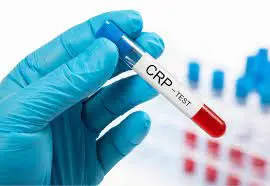C- Reactive Protein (CRP) Test
The C-reactive protein (CRP) test measures the level of C-reactive protein in a sample of your blood. CRP is a protein produced by the liver in response to inflammation in the body. Normally you have low levels of CRP in the blood; whenever there is inflammation, your liver releases more CRP into the bloodstream. The high levels of CRP mean you may have a condition causing inflammation.
Inflammation is a body’s way of protecting your tissues and helping them to heal from an injury, infection, or disease. The inflammation can be acute (sudden) and temporary, which is helpful; e.g., if you cut your skin or got hurt, your skin may turn red, swell, and pain for a few days and heal thereafter.
Inflammation can also happen inside the body. If the inflammation lasts for a longer time, it can damage healthy tissues; this is called chronic (long-term) inflammation. Chronic infections, autoimmune disease, and other diseases can cause harmful chronic inflammation. Chronic inflammation can also happen if your tissues are repeatedly injured, for example, from smoking or chemicals in the environment.
A CRP test shows whether you have inflammation in your body and how much. But the test can’t show what’s causing the inflammation or which part of your body is inflamed.


